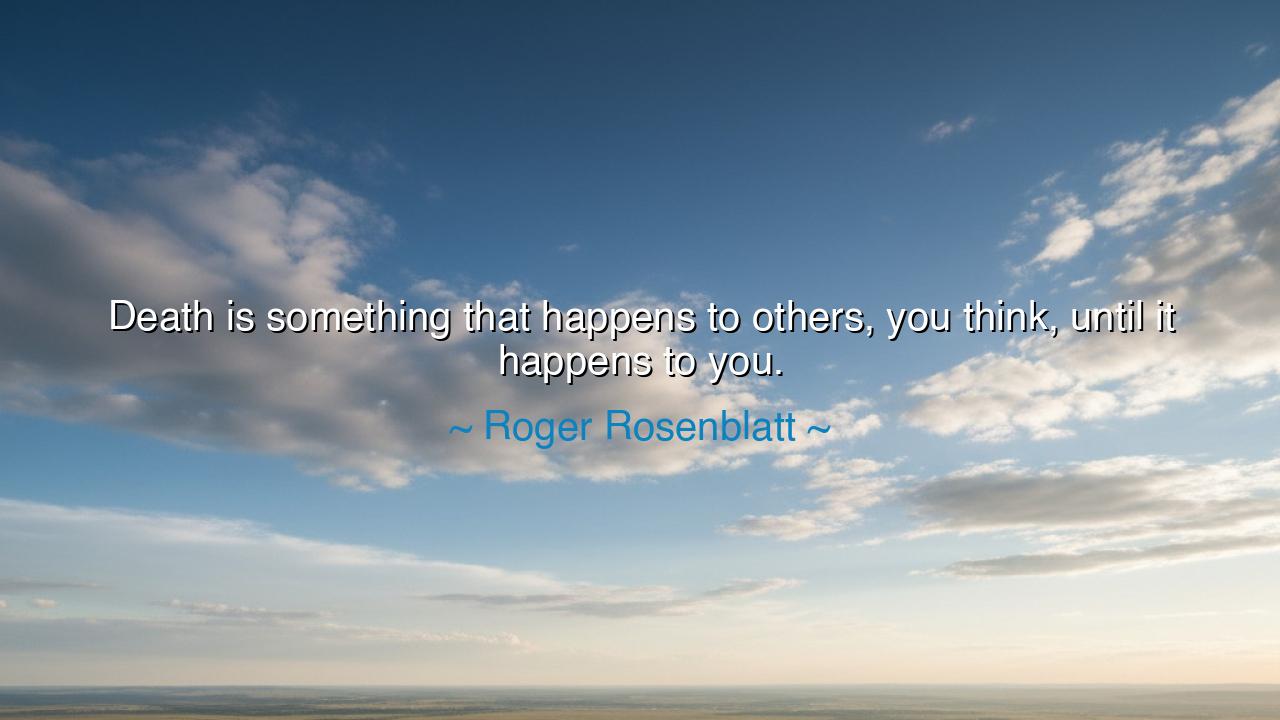
Death is something that happens to others, you think, until it






In the councils of quiet sorrow, hear Roger Rosenblatt’s steady line: “Death is something that happens to others, you think, until it happens to you.” The sentence moves like a tide—first receding, then rushing in. It names our ordinary illusion: that the ultimate interruption belongs to some distant shoreline, not to our own door. Then it overturns that illusion with a single turn of phrase—until—and we stand drenched in the same water we watched from afar. The wisdom is not morbid; it is clarifying. It instructs the heart to live awake, because the boundary we call death is not a rumor but a certainty, not a spectacle but a personal appointment.
Rosenblatt learned this cadence by walking through the valley himself. After the sudden loss of his daughter Amy, he wrote first the New Yorker essay “Making Toast,” then the memoir of the same name, and later Kayak Morning, each a meditation on grief as a daily practice—love learning to breathe beside absence. In those pages and interviews, he refuses melodrama and offers attention instead: the ache of breakfast, the work of showing up, the way grief sculpts an ordinary day into a sanctuary. The quoted line, widely attributed to him, fits this body of work: a plainspoken truth distilled from intimate loss.
What does the line teach? First, that distance is our favorite defense. We watch funerals like weather reports; we speak of statistics; we say “they.” But grief converts grammar: the third person becomes the second and then the first—you, then I. When that conversion happens, life changes register: sound grows sharper; time grows dear; kindness becomes necessary rather than decorative. The sentence therefore is a summons to apprenticeship before the storm—to practice the arts that will matter when the until arrives: presence, forgiveness, order, gratitude.
Consider a small, true story. A neighbor—healthy, hurried, invincible in his own telling—spent years postponing reconciliations and ordinary joys. “After the next quarter,” he would say. Then came the phone call, the scan, the word no one plans to hear. In the months that followed, he became a different man: he wrote letters, taught his daughter to make the family stew, called his estranged brother to simply listen. “I thought death belonged to other families,” he said one evening, “and then it knocked.” The change in him did not come from fear, but from clarity; Rosenblatt’s until had turned the lens, and he saw what had always mattered.
History bears witness, too. Ancient orators, from Pericles to the Roman moralists, urged citizens to remember mortality not as a terror but as a tutor. The exhortation memento mori—remember you must die—was never meant to shrink life; it was meant to enlarge it. Rosenblatt’s modern sentence wears the same old garment. It asks us to bring the far horizon near now, so that our priorities are set by reality rather than postponement. When the until is kept close, we love more cleanly, we speak more honestly, we give more freely.
From this teaching flow simple, stern practices. Keep short accounts: apologize quickly; forgive without interest; say the praise you are saving. Tend the living: visit, call, cook, accompany. Order your house: write the documents, label the passwords, place blessings where hands can find them. Mark the day: each evening note one gift received and one gift given. These are not rehearsals for dying; they are rehearsals for truth. They make us ready for the knock we pretend we do not hear.
There is also comfort here. When the until arrives, you are not singled out—you are joined. You take your place in the human procession that Rosenblatt describes with such quiet accuracy: parents, lovers, friends, each learning the same hard grammar and the same soft skills of endurance. His work demonstrates that grief can be companioned, that life can be re-knit, that love—even wounded—can still do its work. The sentence does not end in darkness; it points to a light made honest by shadow.
Carry the cadence like a pocket rule: Death—others—until—you. Let it dissolve your vanity and your delay. Let it turn your gaze toward the faces that need you, the tasks that honor them, the words that build what lasts. For when the tide that belongs to everyone reaches your own shore, may it find you already practicing the ancient arts—awake, reconciled, and generous—so that even in the storm, your life speaks clearly of what was always true.






AAdministratorAdministrator
Welcome, honored guests. Please leave a comment, we will respond soon